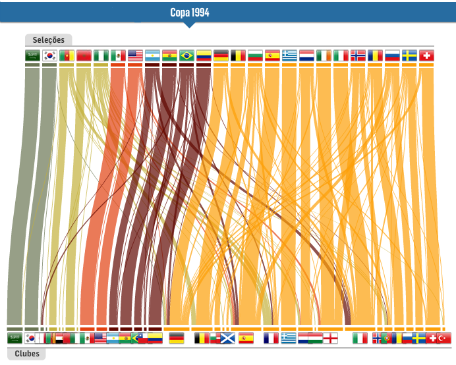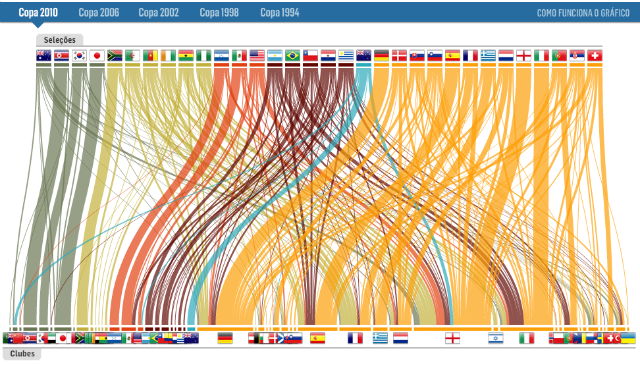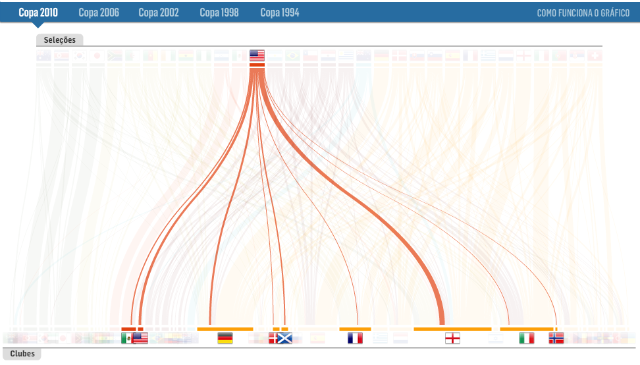By: Inoljt, http://mypolitikal.com/
In the past few decades, the phenomenon of globalization has swept through the world. The world is more open and interconnected than any other time throughout history. Proponents of globalization argue that its effects have lifted hundreds of millions out of poverty, from places as diverse as China to India to South America. Opponents argue that globalization and free trade have led to rising inequality, damage to the environment, and jobs lost for millions of American workers.
Whatever the truth, globalization appears unstoppable. The greatest economic crisis since the Great Depression has barely dented the network; only another world war could truly undo its effects.
The World Cup offers a good illustration of globalization.
More below.
The history of modern soccer contains a rich tradition in the veins of globalization. For decades, Third World countries have sent their best footballers to play in the First World, especially the great leagues of Europe: Italy’s Serie A, La Liga of Spain, and – above all – England’s Premier League. In World Cups, these players return to represent their home countries and win the World Cup championship.
Here is how the system looked in 1994:
(Note: This graphic comes from a Brazilian website, which can be accessed here. Click here for a larger image.) On top are each of the countries which participated in the 1994 World Cup; below are the national leagues of each country. The connecting lines indicate the leagues in which a country’s footballers play when not representing the national team. In some countries – Saudi Arabia, for instance – all the footballers played at the home league; in others, such as Norway and Brazil, the majority of footballers played in foreign leagues.
Here is how this phenomenon looked in the most recent World Cup:
(Note: Click here for a larger image.)
Sixteen years after 1994, the system has exploded as globalization has set in. More footballers than ever play in countries outside their home. They go to a bewildering variety of different places, from Israel to Germany to even Saudi Arabia. In 1994 the majority of the World Cup team played outside home in 6 (out of 24) teams; today this figure has expanded to 22 (out of 32) teams. Even North Korea, perhaps the most isolated country in the world today, had three players participating in leagues outside the country. Then there are countries like Nigeria: not a single person on its team plays in the domestic league.
The globalization of soccer has had several effects. European leagues such as England’s Premier League now rely heavily on foreign talent. Famous clubs such as Real Madrid, Manchester United, and Juventus have combined the best of the best in the world to form teams of unprecedented skill. Indeed, the level of play in club competition – especially the European Champion Clubs’ Cup – is generally regarded as better than that of the World Cup.
Finally, one might wonder which teams do better – those that outsource their talent, or those that develop it domestically. The answer seems to be that it doesn’t make a difference. Brazil, for instance, has a long tradition of sending players to Europe – and it is widely regarded as the world’s best soccer team. However, so do a number of African teams such as Cameroon and the Ivory Coast. These teams came in the 2010 World Cup with high expectations and talent, but generally underperformed.
On the other side, soccer powers such as Spain and Germany keep talent at home. However, so does North Korea – a team which came in dead last. It is difficult to draw a reliable distinction. Perhaps fittingly, out of the four top teams in this year’s World Cup two had most of their players go overseas, while the other two had most play at home.
P.S. For those interested, here is a graphic of the United States soccer team. Out of 23 players, nineteen play abroad.



15 comments